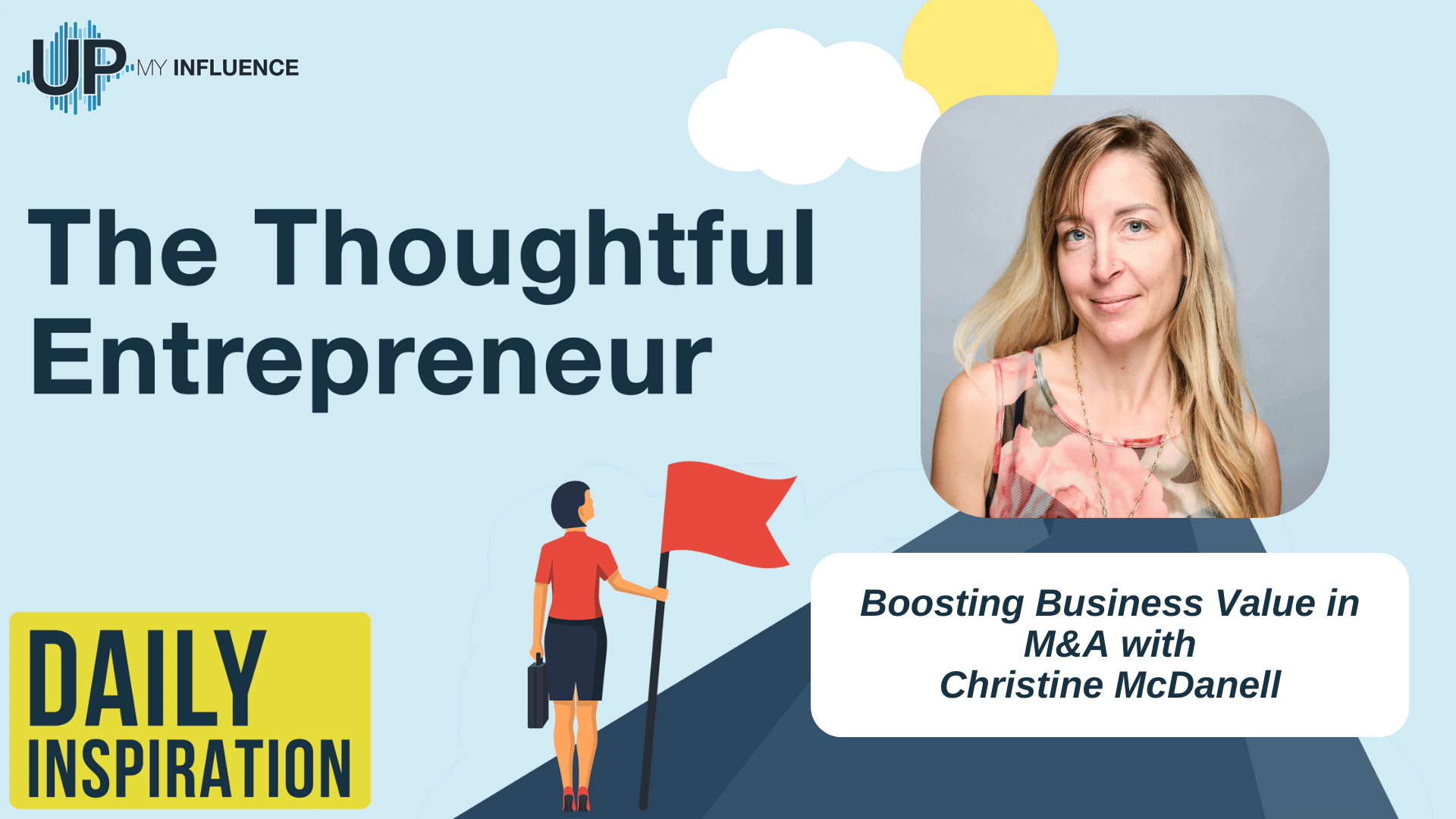THE THOUGHTFUL ENTREPRENEUR PODCAST
In this episode of the Thoughtful Entrepreneur, your host Josh Elledge speaks with the Principal, Business Intermediary & Broker of The Magnolia Firm, Christine McDanell.

Christine McDanell is not just an expert in her field; she's a guiding light for those navigating the often turbulent waters of M&A. As the principal and founder of The Magnolia Firm, she brings a unique perspective, one that's been honed by years of hands-on experience and a deep understanding of market trends.
One of the critical insights Christine shared was her take on the current market trends within the tech industry. The landscape constantly evolves, and staying abreast of these changes is crucial for anyone looking to maximize their business's value. Christine's expertise allows her to forecast these trends and advise her clients accordingly, ensuring they're always a step ahead.
Financing plays a pivotal role in the M&A process, and Christine shed light on the various lending options available to businesses. She emphasized the importance of understanding these options to secure the best possible outcome in a transaction. Moreover, Christine provided strategies for maximizing business valuation, a critical aspect for any seller aiming to get the most out of their exit.
The role of a broker cannot be overstated in the world of M&A. Christine discussed how a broker can facilitate the process, acting as a mediator between buyers and sellers. She highlighted the benefits of having a broker on your side, from their ability to negotiate better terms to their expertise in closing deals efficiently.
Christine also mentioned her upcoming book, “Get Acquired,” which is an essential read for anyone considering selling their business. The book aims to provide practical guidance, demystifying the process and offering actionable steps to prepare for a successful sale.
Key Points from the Episode:
- Introduction of Christine McDanell , M&A consultant and founder of The Magnolia Firm
- Expertise in mergers and acquisitions, particularly in the tech industry
- Insights into current market trends and lending options
- Strategies for maximizing business valuation
- Role of a broker in the M&A process
- Tips for sellers and buyers in navigating the transaction
- Mention of upcoming book “Get Acquired” for practical guidance on selling a business
About Christine McDanell:
Christine McDanell is the enterprising Founder & Principal Business Intermediary of The Magnolia Firm, a brokerage specializing in M&A for digital businesses. With a knack for orchestrating seamless exits, her firm ensures entrepreneurs don't compromise their values while achieving their desired outcomes. TMF boasts a 100% success rate in exits, often securing deals at or above the asking price.
Christine's entrepreneurial journey is marked by her success in founding, growing, acquiring, and selling over 20 businesses across diverse sectors like cleaning, wellness, beauty, technology, exotic cars, and real estate. This vast experience led her to discover a formula for perfect business sales, which she now imparts to others.
Her career highlights include creating 200+ jobs since 2003, and a memorable breakfast with Richard Branson in 2017, recognizing her contributions to the Virgin Unite Foundation. She's earned accolades such as the SBA Business Person of the Year (2009) and a spot in Entrepreneur Magazine's 100 Most Brilliant Companies for Cleanology (2010).
Away from work, Christine enjoys live music festivals, spontaneous global travels, attending Burning Man, and captaining boats in San Diego Bay.
About The Magnolia Firm:
The Magnolia Firm (TMF) stands out in the M&A brokerage landscape, focusing on transactions for small and medium-sized digital businesses (SMBs). What sets TMF apart is their commitment to exceeding expectations in both experience and results. They aim for a win-win scenario, ensuring that all parties in a transaction are more than satisfied.
TMF's unique edge lies in its team composition. Unlike typical brokers, TMF's intermediaries are seasoned entrepreneurs. This entrepreneurial background is crucial.
It means they have firsthand experience in owning and running businesses, giving them an unparalleled understanding of their clients' perspectives and needs. This experience allows them to deeply empathize with business owners, aligning closely with their interests and expectations.
By leveraging their personal business experiences, TMF intermediaries can navigate the complexities of digital SMB transactions more effectively, ensuring a more tailored and satisfying experience for all involved. This approach has helped TMF carve out a distinct niche in the competitive world of M&A brokerage.
Apply to be a Guest on The Thoughtful Entrepreneur:
https://go.upmyinfluence.com/podcast-guest
Links Mentioned in this Episode:
Want to learn more? Check out The Magnolia Firm website at
https://www.vanderbloemen.com/
Check out The Magnolia Firm on LinkedIn at
https://www.linkedin.com/company/the-magnolia-firm/
Check out The Magnolia Firm on Instagram at
https://instagram.com/themagnoliafirm
Check out The Magnolia Firm on Facebook at
https://www.facebook.com/themagnoliafirmco
Check out Christine McDanell on LinkedIn at
https://www.linkedin.com/in/christinemcdannell/
Check out Christine McDanell on Twitter at
https://twitter.com/SS_Christine
More from UpMyInfluence:
We are actively booking guests for our The Thoughtful Entrepreneur. Schedule HERE.
Are you a 6-figure consultant? I’ve got high-level intros for you. Learn more here.
What is your #1 Lead Generation BLOCKER? Take my free quiz here.
Want to learn more about all the podcasts managed by UpMyInfluence? Opt in here.

